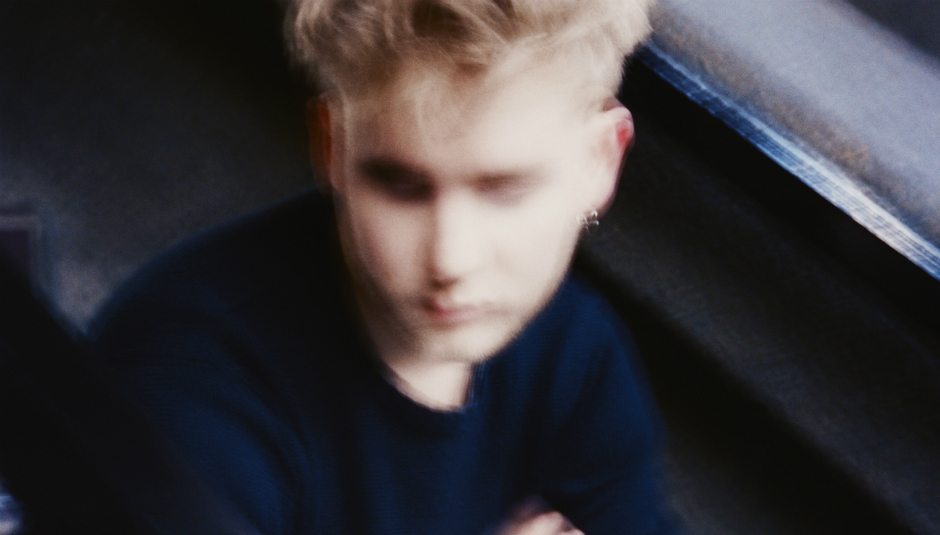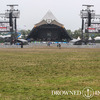Mura Masa’s debut album is titled Mura Masa. This eponymous title tells us that in some way it will be a portrait of the artist as a young man. While James Joyce’s novel was about the journey of a child to an artist (and, arguably, pretentious arse) it was equally about the background of the portrait, the country and the city that shaped Joyce. Similarly, Mura Masa is an album about the blooming of an artistic consciousness in the city of London. For Mura Masa, born Alex Crossan, moving to our nation’s capital has become a transformative experience. It’s not hard to see why.
It should be plainly obvious that London’s unique population has contributed to its dominance as a musical city par excellence. According to the 2011 census, roughly 45% of the London’s residents identify as ‘white British’ (a figure that was almost 60% in 2001). Much of the city’s identity, then, comes from its large Asian/Asian-British (18.49%) and Black/Black-British (13.32%) communities. The sociologist Paul Gilroy noted that due to its large black community, the city is at the centre of a hybrid musical culture called “The black Atlantic” that sees musical interaction between forms from Africa, the Caribbean, America, and Europe. This cultural phenomenon easily makes London the rival of musical melting pots like New Orleans or New York and has led to the flourishing of cultures from the mutual interest between punk and reggae in the ‘70s to the innovations of London-based dance music from the ‘90s onwards (jungle, drum ‘n’ bass, grime, garage, dubstep).
Mura Masa is hardly the first white musician to make an album-length love-letter to multicultural London. To white Brits, the city can simultaneously feel “exotic” and “like home”. It is a place where dominant Anglo-Saxon principles are challenged and accepted in different ways. Albums from London Calling to London Zoo almost make a genre of “white boys love multicultural London” to themselves. They suggest patriotism as a commitment to a country that is constantly in flux, rather than an attempt to preserve a whiter romanticised past. Of course, these artists could also be accused of romanticising or exoticising London’s multiculturalism (something Crossan at least is aware of).
This portrait of London that Mura Masa gives us has certainly been painted warts-and-all. The album starts with the everyday sounds of the city as it lives and breathes: a siren wails and the inexplicably well-spoken voice of the public transport tannoy informs us of our next stop. Mura Masa is telling us that this is London as experienced by the man on the street, not its elite 1%. The songs on the album (and their accompanying videos) tell tales of characters as they fall in love, break up, dance, and go about their ordinary lives. Mura Masa seems to pass through London like a transparent all-listening ear (to bastardise Ralph Waldo Emerson). He takes in the sounds of music playing, of lovers quarrelling, and of trains passing and reflects it all back into his heterogeneous pop. Stylistically, it can be hard to pin a name on his sound after its numerous cross-Atlantic voyages, but it’s a distinct fusion of various elements of British and American dance and rap styles. An idea can be inferred from the album’s features, with a variety of Londoners (Damon Albarn, Charlie XCX, Nao, A.K. Paul) as well as a couple of American rappers (A$AP Rocky, Desiigner) appearing on its tracklist.
This love affair with London’s grey mystique started for Crossan in his birthplace on the Channel island of Guernsey. Although moving away from this remote island seems to have stemmed less from a pathological need to leave behind his past but to get out of a “comfort zone”, like many Brits before him, he had long since escaped his “entirely white community” with the help of the music of black American southerners. Through finding Lil Jon & The East Side Boyz’ ‘Get Low’ in the music to Need For Speed: Underground, Crossan fell in love with hip-hop. That song’s abrasive energy and lyrical content were unlike anything he had heard living in his safe island community where “everyone knew what everyone else was up to”. With the help of the Internet, Crossan was able to discover that “rap is a rabbit hole” and his Lil Jon obsession “turned into an appreciation of all things hip-hop.” Rap’s wonderland included not only dirty south and trap rap but also J Dilla (who at this point may as well be the patron saint of producers). Crossan was then able to discover electronic music through artists who were re-thinking electronic music after dubstep. Of particular interest was James Blake, who managed to place soulful vocals within bass music, and members of Glasgow’s LuckyMe crew (Hudson Mohawke, Rustie, Cashmere Cat, S-Type), who found common ground between southern rap and dubstep’s bass-centric production styles. This fusion of influences has led to Crossan’s music sounding like it could’ve been made at no other time or place.
DiS: I feel like a lot of great music has been made by Brits who are inspired by the music of black Americans. What do you think the fascination is with black American music?
Alex Crossan: I just think that without wanting to be too black and white about it – if you’ll forgive the pun – the DNA of popular culture, and specifically popular music, is black and the lineage of a lot of, if not all, popular music can be traced back to black artists. I think it’s an important thing to know, to kind of do your homework on.
The music critic Simon Reynolds calls this process a “creative misrecognition”. White kids are trying to copy this music but they’re going to get something different because their own experience is different. Is that something you feel you’re doing? Obviously, you’re not making straight hip-hop.
I think any creative endeavour is a reinterpretation. It’s taking influence from something and putting your own spin on it. With me it’s quite intentional, I try and intentionally subvert it. I guess most of the people in England try making hip-hop or American style hip-hop but they come out making something different. It’s like a creative back-and-forth. I think America also looks towards the UK for a lot of musical and cultural cues.
Especially at the moment with Drake, who seemingly thinks he’s from London at the moment. Stormzy and Skepta are huge worldwide.
Yeah, what’s happening with the revitalisation of grime music, there’s kind of been a re-activation of that community. It’s great to see people celebrating things like Jamaican patois and being able to learn about where that comes from. It’s an educational thing, it’s like a celebration. A lot of people would want to put a negative spin on the Drake thing —him speaking in patois or whatever — a lot of Toronto’s communities are made up of people from those countries. It’s easy to badmouth things like that but you’ve got to be open to it and recognise it as a celebration.
I think at the end of the day some people just want to hate on Drake. It seems very easy.
Very easy to hate on.
It feels like the music you’re making is what Britpop should’ve sounded like: British pop music that sounds like the cultural identity of Britain, taking all these disparate immigrant communities and making pop out of it. Groups like Basement Jaxx, or I know you’re really into Gorillaz, really sound like a fusion of all that music in today’s Britain. Is that a Britain you’re proud to be a part of?
Yeah, I definitely think so and that’s a really conscious thing for me. Probably my favourite thing about the UK is how it’s a melting pot and in a postcolonial Britain there are all sorts of cultures — you’re never out of new people to meet from different places. I just want this project to be collaborative in the widest sense of the word.
Britain seems to be really struggling with issues of its own identity at the moment, but you’re presenting it as a beautifully multicultural place — in stark contrast to that of the Tory, UKIP, Brexit idea of it. Is that something you’re conscious of?
I think it’s more of a representation of what I’ve seen since I’ve moved to London. It’s been an explosion of learning about how these cultures sit alongside each other and kind of coexist. It’s probably quite a utopian vision of multicultural coexistence, but that’s from my own experience of living in London for a while now. Obviously, London isn’t Britain; that’s kind of a wider question to be tackled at the moment, and there’s a delicate political climate around that now. I just think why not demonstrate that there is a way for it all to come together in a kind of unified vision? But not in a flower power kind of way.
A lot of the guys who were really pushing folk music were these (occasionally communist) socialist guys who wanted to push it as a music of the people, a common art that everyone can get into rather than an elite art like classical music. It’s kind of bringing pop, something that everyone can like, to the people. Is that a way you feel about pop music, it being accessible and slightly revolutionary at the same time?
I just think that it’s important to be challenging, but at the same time, music that everyone likes is amazing. I just think the world’s smaller than ever now. You’re only ever a click away from finding out about anything you want to in the entire world. That needs to be reflected in popular music as well. That’s the kind of direction I’m pushing for.
I feel that people that grow up listening to your music can maybe have an idea of multicultural Britain from your music. Is that something you feel you’re teaching the kids?
I mean, maybe not in such a grandiose way. I’m not in a revolutionary position and I’m not particularly political in my creative output, but I think it’s important to show through the collaborators, the sonic influences, to show people a bit of everything. The album’s full of people of different upbringings, different countries, different sexualities, different races. It’s not a concerted effort to be all “Oh, let’s all live as one” or whatever, but just to kind of show that this is how the world is now and people need to be ready for that change in popular culture.
It’s a great vision, even if it’s not quite as concerted and utopian as I’m making it out to be. Do you think that that’s something artists should be aware of, having a political responsibility?
I’m not sure. That’s a tough question because music for its own sake is sometimes the best and most experimental. It’s just kind of my choice as an artist to bring that side of it to the music, but I’d say the most important thing to me is just making good music.
It feels like London, in a less social or political way, is really important in your music. One of the later tracks on the album has breakbeats on it and that classic grime ice…
The ice clink.
That’s the one! I mean it scans as ‘London’. Growing up away from London was there like a mystique to it for you?
Definitely. The first time I went to London you see the London Eye or a West end show or something, you go to Madame Tussaud’s, you look at Big Ben and all the things you’ve seen on TV or whatever. But then when I came to live here, I moved straight to South-East London which is the opposite of central London and for me, it just felt like Tortuga from Pirates Of The Caribbean. Where they walk in and everything is just gestating. It felt more like a pirate port than anything!
Mura Masa's self-titled debut is out on 14 July via Interscope. He plays Rock Werchter festival on Thursday 29 June. For more information, please visit his official website.






















